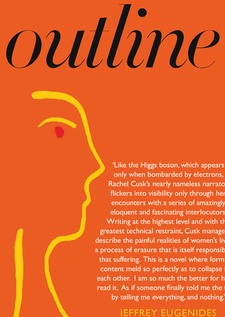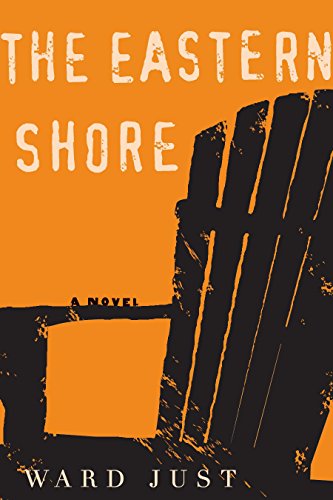Rachel Cusk introduces her readers to a cast of characters in Outline; these characters don’t interact with each other much, and the only action to move the narrative forward is a series of monologues about their lives. I wouldn’t blame you for thinking, Why would I want to read that? Well, you would want to read it for the unique insights that intelligent and articulate people bring to judging themselves and their lives. In Ms. Cusk’s hands, this turns into a very compelling read.
Our first-person narrator, a woman whom Ms. Cusk takes the trouble to identify only once in the book - by first name only - meets a talkative Greek gentleman on a flight from London to Athens. This older man recounts the struggles he has had through a series of marriages, and this is the first of our deep and wide-ranging conversations. His tale of woe continues on a couple of jaunts they take together on his powerboat, and the narrator finally confronts him about the self-serving nature of his complaints, and the built-in hopelessness of his approach to women. His reaction to this carries perhaps the central theme here: he confesses his attraction for her and awkwardly approaches her across the deck of his boat to give her a clumsy, ill-aimed kiss, which winds up on her cheek.
His refusal or inability to change his attitude toward the people he meets aligns with the other stories told here by other characters. There is the beautiful woman who can’t get past something she overheard her lover tell someone. There is the fellow writing teacher who climbs away from a dreary life of illness and stagnation in Ireland on a stair-climbing machine in America. There is the poetess who encounters the same unstable man, who may or may not be a fan, on all her readings throughout Europe. The narrator subjects her own life to the same kind of scrutiny, and she has imposed a self-exile with her trip to Greece.
Ms. Cusk rivets us to the page with the depth of her characters’ observations about life and love and various philosophical issues. There is a wide variance between our private and public domains, for example; in given situations some people immerse themselves in the moment while others become detached, observing for transcribing later. We have observations about the infinite capacity for humans to delude themselves, about how safety and security are illusions, about how people can go through life missing all its essential truths, remaining unaffected by all if it in their small, myopic orbits.
Throughout this, the author makes intermittent use of quotation marks, which makes all the speech appear more detached, less personal. Thus are thoughts and beliefs given to the reader, in an exposition in which we must read into the person’s remarks their frustrations and beliefs and hopes.
You will need to be prepared to encounter a wide range of ideas at the expense of structured plot; you will need accept self-exposition in place of dramatic action, to enjoy and appreciate this book. It’s fortunate that I am habitually in that realm and could sample these dishes with pleasure.




















